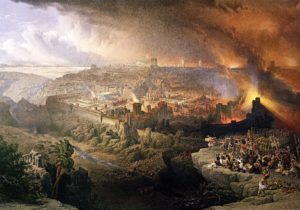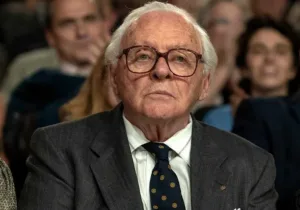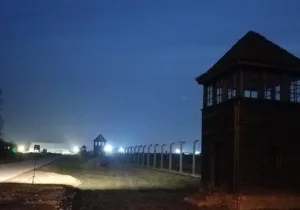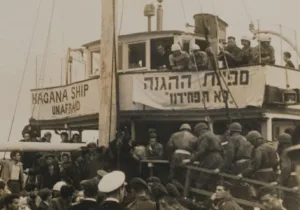Unknowingly but providentially, I went to see the new movie about Auschwitz on Holocaust Remembrance Day. The Zone of Interest isn’t directly about the death camp’s horrors. Instead, it focuses on the idyllic home and lives of its commander Rudolf Höss and his family.
Their house literally abuts the camp’s walls. It’s beautifully decorated, with furniture stolen from Jews, staffed by Polish servants, and surrounded by luscious gardens with a large green house, plus a swimming pool. Mrs. Höss would call it “paradise.” The horrors over the wall are never shown. They don’t need to be. Instead, we hear occasional cries of agony and gunshots. Distant chimneys belch black smoke by day, and their fires illuminate the sky by night.
The Höss family swim in a nearby lake, fish in a nearby river, entertain in their lovely home and enjoy scrumptious meals. They dress well with stolen clothes from Jewish captives, among other goodies. Mrs. Höss models a long fur coat. Talking to a lady friend, she boasts of finding a diamond ring hidden inside a tube of toothpaste. “They’re so clever,” the lady friend responds. The Polish maid is warned that if she underperforms, her ashes could fertilize the field. One Polish girl servant at night leaves apples for the inmates in their hellish quarry. Later we hear an inmate fight over one of the apples and is shot.
Mrs. Höss’s mother visits her daughter, noting that the Jewish woman for whom she once worked as a maid, and whose draperies she now owns, could be over the wall. She commends her daughter on her sumptuous surroundings. Such an accomplishment! But the mother has a restless night. She hears the cries and gunshots. Looking out the window, she sees the illuminated sky. She tosses and turns. The next morning, she is gone, leaving behind only a note. Seemingly it was all too much, even for her.
Representatives of a German firm visit Hoess’s office to discuss the purchase of new furnaces. It’s all just business. But then word arrives that Höss will be transferred. He hesitates to tell his wife, who will be distraught. When he does, she is angry. How could this happen? They are so happy! She insists that he can leave for his new job while the family retains the lovely house.
Höss’s new job is helping organize the seizure and destruction of Hungary’s hundreds of thousands of Jews. He excitedly reports his new assignment to his wife by phone. Such an opportunity! The family is moving ahead. Except events intervened in their prosperity. After the war, Höss is captured, tried, and hanged. Mrs. Höss and the family lived quietly in Germany. One daughter married an American and lived for years in Washington, DC, disguising her ancestry. Her employer was Jewish and, who after learning her identity, assured her employee that she was not responsible for her father’s crimes. Mrs. Höss died in DC while visiting her daughter in 1989. Her daughter, herself suffering from cancer, in 2013 guardedly talked to a reporter. She had ambivalent thoughts about her father and, without denying his crimes, wondered if the Holocaust were not at least partly exaggerated. “He was the nicest man in the world,” she recalled of him. “There must have been two sides to him.” Indeed.
Everybody does have two sides, although the dark side for most, restrained by divine grace, never reaches the depths of Commandant Höss. The Ulma family in Poland heeded their noble side when they unhesitatingly sheltered escaping Jews who desperately knocked on their door. When discovered, the Nazis shot the Jews plus all the Ulmas, which included father, pregnant mother and six children. The horror did not end there. Terrified local Poles who also were sheltering Jews preemptively killed them to protect themselves. Twenty-four dead Jews were found the next day. Evil begets evil.
Last September Pope Francis beautified the martyred Ulma family, including the unborn child, as a step towards their sainthood. The Ulmas, Francis said, “represented a ray of light in the darkness” by “doing good and in the service of those in need.”
Heroically doing good, especially when lethally dangerous, is uncommon but does offer a window into the divine. Living adjacent to the nightmarish stink and clamor of Auschwitz, the Höss family savored their stolen luxuries with indifference to mass murder next door. The Ulmas modeled heaven, for which they were murdered, and ultimately honored. The Hösses modeled hell, from which they initially benefitted, only later to suffer ignominy. There is always a judgment.
The Zone of Interest exquisitely portrays the Höss’s demonically delusional “paradise” at Auschwitz. It is instructive for us all. How easy it is to look away from horrors if we ourselves are comfortable.







 Sponsor a student for Christianity & National Security 2024
Sponsor a student for Christianity & National Security 2024